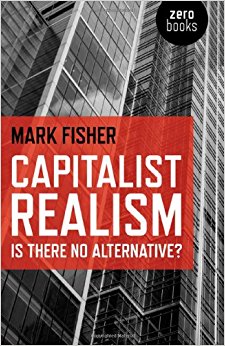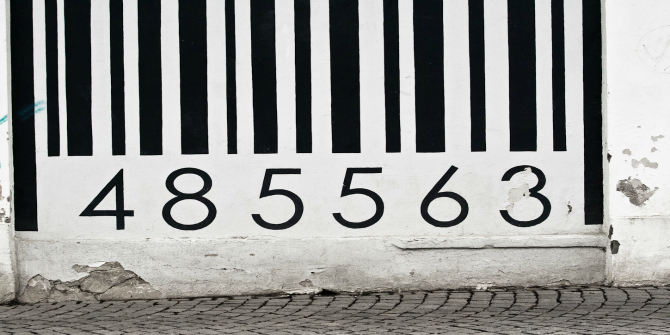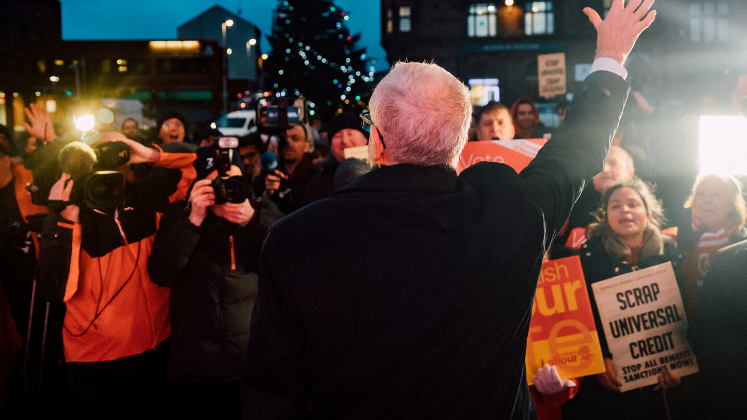In Opening Capitalist Realism, Alfie Bown pays tribute to the work of the late writer and philosopher on all aspects of capitalism, Mark Fisher. Drawing on the glimmers of hope enfolded in Fisher’s 2009 work Capitalist Realism: Is There No Alternative?, Bown argues that the events of 2016 have turned the glimpses of optimism identified by Fisher into concrete and pressing opportunities for rupture in the workings of capitalism – ones that he urges the Left to seize.
Opening Capitalist Realism
 One of the prominent arguments about capitalism that has circulated in the political and philosophical discourse of the last decade is the idea that ‘there is no alternative’. The idea ‘originates’ – insofar as it can be talked about in such terms – in the work of Frederic Jameson, before it was used to wider effect by Slavoj Žižek and by the wonderful philosopher of all aspects of capitalism, Mark Fisher, who was very sadly lost in January of this year. Fisher’s 2009 book Capitalist Realism – a significant influence on me personally – demonstrated the peculiar capacity that capitalism has to sell its discontents back to the consumer as commodities. In a capitalist realist system, expressions of opposition to the socio-political situation, from Nirvana to The Hunger Games, are always-already transformed by the smooth logic of capitalism into its very products for sale. Likewise, acts of subversion, resistance and even protest are absorbed and re-presented not as attempts to develop alternatives, but as parts of the capitalist conversation open for negotiation only in its own language. I argue here that this situation, which Fisher so powerfully described, has changed.
One of the prominent arguments about capitalism that has circulated in the political and philosophical discourse of the last decade is the idea that ‘there is no alternative’. The idea ‘originates’ – insofar as it can be talked about in such terms – in the work of Frederic Jameson, before it was used to wider effect by Slavoj Žižek and by the wonderful philosopher of all aspects of capitalism, Mark Fisher, who was very sadly lost in January of this year. Fisher’s 2009 book Capitalist Realism – a significant influence on me personally – demonstrated the peculiar capacity that capitalism has to sell its discontents back to the consumer as commodities. In a capitalist realist system, expressions of opposition to the socio-political situation, from Nirvana to The Hunger Games, are always-already transformed by the smooth logic of capitalism into its very products for sale. Likewise, acts of subversion, resistance and even protest are absorbed and re-presented not as attempts to develop alternatives, but as parts of the capitalist conversation open for negotiation only in its own language. I argue here that this situation, which Fisher so powerfully described, has changed.
Carrying the subtitle, ‘Is There No Alternative?’, Fisher’s book ends with optimism about the possibility of change and with the claim that in capitalist realism, ‘even glimmers of alternative political and economic possibilities can have a disproportionately great effect’ and can make ‘anything possible again’. Fisher’s tone may discourage resistance by implying that little can be done aside from hoping for miniature ruptures and ‘glimmers’ of ‘possibility’, but I argue here for a change between 2009 and 2017 in this regard. A closed capitalist system that smooths over cracks and automatically ensures efficiency is now broken, to reveal much more than a glimmer of alternative political and economic possibility. The question that remains is that of who will take advantage of the opportunities presented by the rupture.
For Žižek, a fundamentally anti-capitalist author and activist, it is important to realise that in a certain sense there is ‘no escape’ from capitalism. From this perspective, to be anti-capitalist means not to be outside of capitalism or even to try to get outside of it, but to oppose the very structure that we are inside and to be honest about our complicity in it. Everything can be seen as a symptom of capitalism, but this should not reduce the radicalism of any such ‘symptoms’, some of which may be useful and necessary while others are copies and reflections of capitalism itself. The word ‘capitalism’ has become so ubiquitous that it can be compared with a term like ‘modernity’, which describes an inescapable present at the same time as it diagnoses a condition that we are necessarily in and therefore constructs that present anew via the reflection. In that sense – if in no other – the end of capitalism is ushered in by the increasing prevalence of the word as a descriptor, forcing us to move into a future that looks back on itself.
The ubiquity of ‘capitalism’ also shows the importance of making concrete demands for change rather than dreaming of utopian or dystopian alternatives. If capitalism has become synonymous with concepts like modernity or with the idea of modern life, it becomes inevitable that it cannot be escaped – but therefore even more pressing that it must be changed. Contrary to being the ultimate expression of the deadlock of our modern predicament, the idea that ‘there is no alternative’ should itself be taken as an opportunity. Furthermore, whether we find it difficult to create projections of an anti-capitalist future or not, such questions are hardly as pressing as the future that is already here. Instead of lamenting how stuck we are, it is time to turn to the fight over the definite changes that are happening.
Its central argument means that Capitalist Realism should already be seen as an important historical document, reflecting the mood in the aftermath of the 2007-08 economic crash. In 2009, we saw perhaps the strongest evidence of capitalist realism when the greatest economic crisis since the Wall Street Crash was ironed out with an efficiency reminiscent of (British and US) school history lessons about bureaucratic Russian communism. That crisis should be seen as having been as much political as it was economic, given what it revealed about a political system’s ability to ‘explain away’ what should really have broken its backbone. In 2017, on the brink of another innumerable round of economic and more widely visible political crises, the same logic will not hold.
We are instead in a moment that Antonio Gramsci would have diagnosed as one in which ‘the old is dying and the new has not yet been born’. The rise of the far-Right, embodied not so much by Trump as by Marine Le Pen, Nigel Farage, Beppe Grillo and even non-politician populists like Milo Yiannopoulos, should not be seen so much as a ‘symptom’ of neoliberalism as the work of successful opportunists. Many of the Left have been arguing that neoliberalism must be seen as the cause of the far-Right, and the argument is made for all the right reasons, insisting that the liberal establishment must be eradicated and rejected as a possible answer to our problems, as I’ve argued myself in an earlier essay. The Left is understandably concerned about the same thing that Mark was: that things might – even now – be smoothed over and put back as they were.
Yet in early 2017, it seems a different possibility needs to be emphasised, warning that reducing the rise of the Right to a mere ‘result’ of the errors in establishment liberalism might in fact be giving too much weight and importance to the liberal establishment, keeping it centre-stage and again reducing the proliferating crises faced today to mere symptoms of the capitalist system that has for so long absorbed all of its dissidents into its own continuous logic. In other words, the argument of the Left, including my own, designed to attack the liberal establishment, might assist its forces of capitalist realism. While the liberal establishment is certainly to blame for the political crises we now face, not everything should be reduced to a symptom of its seemingly inescapable influence. We are dealing with the crises caused by that system, but also with the crisis of that system, which must no longer be allowed to maintain the illusion that we are all trapped helplessly within it. This illusion both discourages the Left from taking action and prevents us from seeing what a serious threat the Right really are.
Instead, we should see the rise of the far-Right, despicable as it is, as an effective opportunism that the Left should rival rather than dismiss as empty (as the word ‘opportunism’ implies). The Left has nothing in common with the Right, despite the attempts of liberals to stress the similarity, but they share – as rivals – a situation of opportunity that we must harness: a crack in capitalist realism. The rise of the Right shows that unlike in 2009, the liberal capitalist establishment will not be able to paper over the cracks as efficiently as it has done for decades, leaving open a future that may indeed be hard (and terrifying) to imagine, but which is coming regardless. The Left needs different tactics, avoiding populism (which works only with what already exists and therefore fails to take advantage of the opportunity for something new), and instead opening this crack in capitalist realism and taking control over the future. Fisher wrote:
Capitalist realism can only be threatened if it is shown to be in some way inconsistent or untenable; if, that is to say, capitalism’s ostensible ‘realism’ turns out to be nothing of the sort.
This is the kind of moment we find ourselves in now. We won’t be getting outside of capitalism just yet, but the conditions of capitalism are shown to be far from inevitable and to at least be cracking and open to reconfiguration.
Recognising that this is a significant moment of rupture in a smooth functioning capitalist-realist system was part of the logic behind Žižek’s now infamous proclamation that Trump might present more of an opportunity to the Left than Hilary Clinton, who was the perfect embodiment of continuous capitalist realism. Sharing the concern of the Leftists discussed above that things would return to their normal unjust configuration once again, Žižek was – perhaps quite rightly – more worried that nothing would change than that everything would. Like the UK’s ‘Lexiters’ who picked the right-wing Brexit for similar reasons, Trump was not worth voting for on these grounds alone (the downsides no doubt massively outweighed this point). However, now that it’s happened, we are in a different situation. It’s our job now to ensure that the rupture that has opened up in our smooth functioning system (which, as Fisher predicted, is now shown to be nothing of the sort) is never closed back up. What remains is not to make the all-too-easy criticism of Žižek, as if he shoulders even the slightest portion of blame, but to take advantage of the opportunity he predicted would emerge as capitalist realism ruptures.
With that in mind, if there is just one lesson (there are hundreds) to take from Fisher, who wrote on everything from the politicisation of depression to the radicalism of electronic music, it should be to pay attention to the gaps and ruptures that appear even in the most impossible situations and to see in these moments vast opportunity and the responsibility to take it. Always looking for the ways to crack an image of realism that operates in the interests of corporations and capital, Fisher searched endlessly for any of these ‘glimmers’ to take advantage of. It may strangely be the best homage to his work to declare the end of the system he described – that of ‘capitalist realism’ – and start the fight over what will replace it: another kind of capitalism for the time being, but a different one whose make-up is yet to be determined. In 2009, when I first opened Capitalist Realism, I doubted – like Mark – that we would really have such opportunities to do so.
Note: This feature essay gives the views of the author, and not the position of the LSE Review of Books blog, or of the London School of Economics.
Image Credit: (batintherain CC BY SA 2.0).









Is there no alternative to capitalism?
When asking this question, everyone who attempts to answer it believes the answer must be some system-wide change. Why?
I have found there is an answer to this question, but the alternative does not do away with capitalism at all, but rather leaves it where it lays and provides alternative models of resource handling and distribution which co-exist alongside capitalism, and not on a macro level but on a micro level, i.e. a choice made by individuals and families, not whole countries.
This model I call the way of the custodian, and a model which, to be frank, should be employed by every religious teacher at a bare minimum, by those who are unemployable (for whatever reasons), and by those who have a desire to renounce money but have not found a lawful way by which to do it.
The benefits of the model are huge, not to mention the peace of mind it would bring to those who operate under it, but because for every person or small group who choose to utilize it, the less are those who compete under the capitalist system.
Capitalism is essential, and to remove it would be to take away its primary principle ‘free-will’, but where capitalism has gone wrong is due to the fact that it has become completely and utterly over-crowded,and I don’t just mean the act of accumulating wealth but even the mere act of treating human needs as commodities and thus forcing everyone to engage in exchange of those needs. The size of the middle class and the size of government are evidence of this over-crowding, largely due to this concept of wanting to achieve the great dream.
There should be a choice as to whether one wishes to engage in capitalism, and take on the risks inherent in it (because it is a game and no one can argue this), or to go the other way and operate a model I call the Way of the Custodian. Both models can co-exist in the same street, town, community, country and the fact that both models exist balances each other out – there is simply no other way that does not involve war and bloodshed.
Thanks for the book review